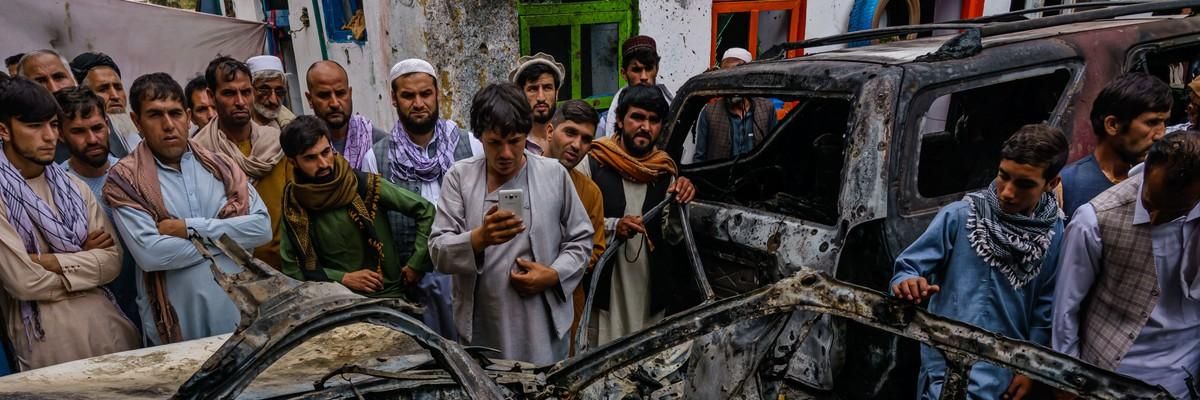Human rights groups were cautiously optimistic Thursday as the United States military--which has killed more civilians in foreign wars than any other armed force on Earth in the post-World War II era--published a plan meant to reduce noncombatant casualties.
"The impact will depend entirely on results."
Declaring that "the protection of civilians is a strategic priority as well as a moral imperative," the Pentagon's 46-page Civilian Harm Mitigation and Response Action Plan (CHMR-AP) lays out a series of policy steps aimed at preventing and responding to the death and injury of noncombatants.
These steps include establishing a civilian protection center of excellence, improving commanders' understanding of civilian environments, developing standardized incident reporting and data management processes, and improving the military's ability to assess and respond when noncombatants are harmed by U.S. attacks.
"Today's announcement marks a promising first step for the Department of Defense to adequately address and prevent future civilian harm caused by U.S. military operations," Daphne Eviatar, Amnesty International USA's Security with Human Rights program director, said in a statement. "However, how and when the military implements these new policies will be critical."
"The U.S. also needs to acknowledge and address the many previous cases of civilian harm that have so far been denied or ignored," she added. "Amnesty has extensively reported on the impacts of U.S. military operations on civilians around the world, and will continue to monitor those impacts while we make recommendations to the Department of Defense to help ensure that human rights are not violated in the name of national security."
The U.K.-based airstrike monitor group Airwars--which along with partners last month published recommendations for the Pentagon plan--called the document "a significant step for transparency."
Annie Shiel, a senior adviser for the Center for Civilians in Conflict (CIVIC) responded to the CHMR-AP's release with a statement commending the Pentagon for the "unprecedented" plan.
"If implemented effectively, the CHMR-AP offers opportunities to address long-standing structural flaws in U.S. policy and practice, prevent future harm, and provide civilians harmed by U.S. operations with the recognition and response they deserve," she wrote. "The hard work begins now, with implementation, and the true measure of this effort will be how it delivers real results for civilians."
Writing for Just Security Thursday, Shiel urged members of Congress to "include important proposals to better prevent and respond to civilian harm caused by U.S. military operations abroad" in the Fiscal Year 2023 National Defense Authorization Act (NDAA), which lawmakers will take up in the coming weeks.
"Successfully reckoning with past civilian harm and overhauling U.S. policies for preventing and responding to harm will require sustained engagement not only from the Department of Defense and the White House, but also from Congress," she asserted.
Listing a series of policy recommendations similar to those detailed in the CHMR-AP, Shiel added that such provisions "would fill critical gaps in Defense Department policy, strengthen and resource [U.S. Defense Secretary Lloyd Austin's] vision for reform, and ensure necessary oversight over the too-often devastating human impacts of the United States' use of force abroad. Congress should ensure that these provisions are reflected in the final law."
While it is impossible to say with certainty how many civilians have been killed or wounded by U.S. bombs and bullets during the course of the ongoing 21-year so-called War on Terror, expert estimates range from several hundred thousand to well over one million.
Airwars credits U.S. President Joe Biden with killing fewer civilians during his first year in office than any of his three 21st-century predecessors. The group said that during Biden's first 12 months, between 10 and 26 noncombatants were killed in 58 attacks in Iraq and Syria, 50 civilians died in 372 strikes in Afghanistan, and six people perished in an unknown number of bombardments in Yemen.
Related Content
Pentagon Blasted for 'Unacceptable Failure' to Reckon With Civilian Casualties
Brett Wilkins
Biden has, however, been accused of following his predecessors' pattern of undercounting the number of civilians harmed by U.S. attacks. Furthermore, high-profile incidents like the August 2021 drone strike which killed 10 Afghan relatives--including seven children--in the closing days of the U.S. invasion of Afghanistan have reinforced peace activists' insistence that the only way to avoid harming civilians is to avoid waging war in the first place.
Update/Correction: This piece has been updated to remove an outdated comment from CIVIC's Annie Shield with a more timely reaction to the Pentagon's new plan.




